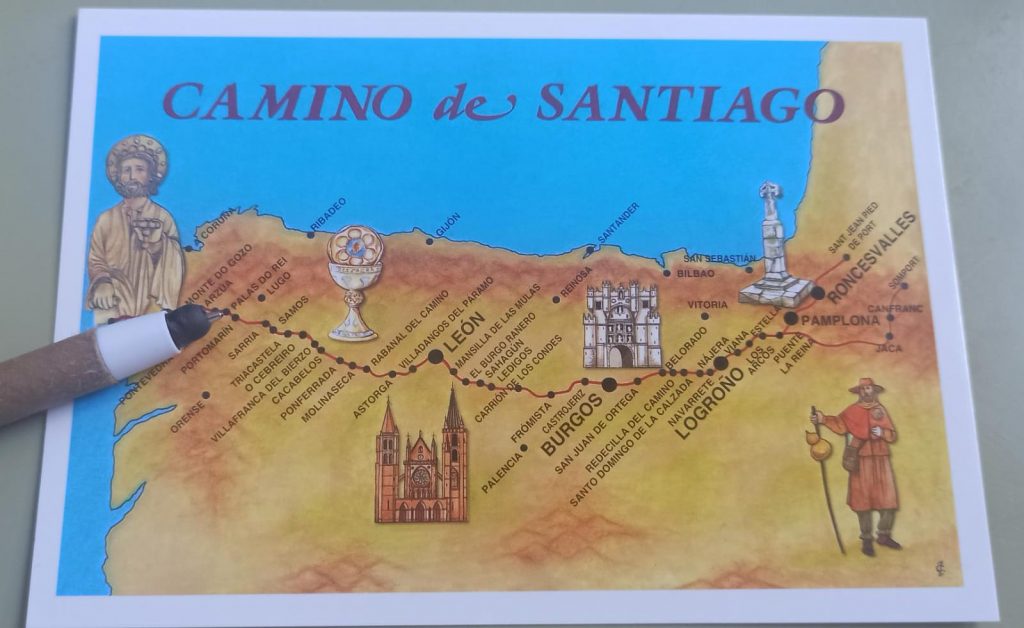
Piligrims´ Life Stories / Historias de Peregrinos
On Fridays there are not many peoples in albergues (hostels) since pilgrims try to get to Santiago by the end of the week. Thus, we have more time to talk to them and learn about their experiences from the Camino (St. James Way).
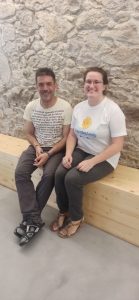
Omar, pilgrim from Logroño started his Camino in Ponferrada. It´s his second time doing the Camino but last time he completed the first part from French border town Saint-Jean-Pied-de-Port till Logroño. His motivation to embark on this adventure is to challenge himself and do some reflections while doing the Camino.
The Camino has been a great learning experience for Omar. It taught him something very important: “I feel that I am much stronger and capable to do more. I have more confidence in myself”.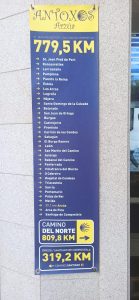
Another pilgrim, Denis, started his Camino very spontaneously getting ready in four days. Walking alone, he managed to meet other people and make friends on his way. He pointed out the advantages of doing Camino on his own as you always can share your way with someone but then continue as you feel like. The Camino has been a great opportunity to come across a mix of different personalities of various cultures but, primarily, see Spanish people from different regions ending up at one place united by the same goal:“What mostly attracted my attention is an incredibly wide range of people on the way”.
Enrique, a pilgrim from Gandía, had his first experience with Camino back in 2016 and wanted to do it in four years but the COVID pandemic and other obstacles prevented him from doing it. Last year after having an accident on his way he had to give up and come back home. This time he is determined to reach the end starting his walk from Villafranca. He thinks that the French Way is the most authentic one that´s why he chose it.
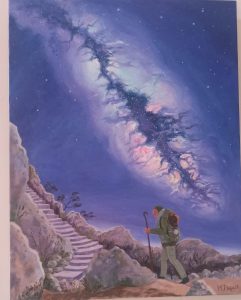
Enrique highlighted that nowadays there are more “tourgrims” rather than real pilgrims. These are tourists that do the Camino with travel agencies, sometimes going on the buses and using backpack transfer services. This is the reason why the Camino is losing its initial religious meaning with more businesses and their economic interests dominating in this sector. Today many people do the Camino following the promotion or to be trendy but in Enrique´s opinion, a true pilgrim should be required to do more that just completing a 100-km route (a required minimum to get the certificate).
Camino gives you time to think and reflect. Moreover, its an opportunity to share: “You have your way that you walk alone but there are always people with whom you can share your experiences, opinions, food, drinks and much more…”
And if you had been doing the Camino, would you have chosen the French Way as well? We hope that these stories will inspire you to follow the example of our pilgrims.
____________________________
Los viernes en los albergues no hay mucha gente, los peregrinos intentan llegar a Santiago el fin de semana por eso tenemos más tiempo para charlar y aprender más sobre sus experiencias del Camino.
Omar, peregrino de Logroño, empezó el Camino en Ponferrada. Era su segunda vez haciendolo. Hace unos años hizo otra parte del Camino desde Saint-Jean-Pied-de-Port hasta Logroño. A él el Camino francés le parece más fácil con más posibilidades de encontrar a otra gente. Su motivación para hacer el camino es un desafío personal, reflexionar y pensar en el Camino.
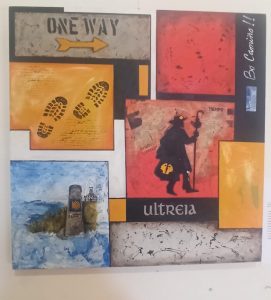 El Camino se ha convertido en un gran aprendizaje para Omar. El Camino enseñó a Omar algo muy importante: “Yo me siento más fuerte y más capaz, tengo más confianza en mí mismo”.
El Camino se ha convertido en un gran aprendizaje para Omar. El Camino enseñó a Omar algo muy importante: “Yo me siento más fuerte y más capaz, tengo más confianza en mí mismo”.
Otro peregrino, Denis, empezó su camino de una forma muy espontánea, se preparó en cuatro días y decidió irse. Caminando solo logró encontrar otros peregrinos y se hicieron amigos durante esta ruta. Notó las ventajas que hay cuando haces el Camino sin compañeros porque puedes siempre compartir la ruta con alguien pero después seguir como prefieras. El Camino fue una gran oportunidad para encontrar a una mezcla de personas de diferentes culturas pero sobre todo a los españoles de regiones diferentes que acabaron en el mismo lugar con un objetivo común: “Lo que más me ha llamado la atención, diferentes tipos de gente”.
Enrique, peregrino de Gandía (Valencia) túvo su primer experiencia con el Camino en 2016 y quería hacerlo en cuatro veranos pero el COVID y otros obstáculos no le dejaron hacerlo. El año pasado un accidente en el Camino le hizo volver a casa pero esta vez está determinado a terminarlo andando desde . Cree que el Camino francés es el original por eso eligió esta ruta.
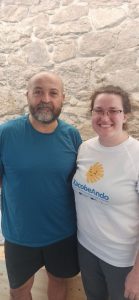
Enrique es monitor de un grupo del Movimiento Scout Católico de Valencia y le gustan las montañas y retos personales, tanto físicos como espirituales. Para él el Camino es superación lo que se puede superar en muchos aspectos. Al mismo tiempo Enrique aprendió que el Camino, al igual que la montaña, te dice cuando hay que parar. Tienes que darte cuenta si no puedes seguir pero siempre si quieres, puedes, y tienes que hacerlo.
Enrique notó que hoy en día hay más turigrinos que peregrinos, los turistas que vienen con agencias de viaje, y por eso el sentido religioso del Camino se pierde con la parte lucrativa, comercio negocios que dominan en este sector. Mucha gente lo hace por la publicidad, pero en su opinión, para recibir la Compostela es necesario hacer más esfuerzo que solo caminar 100 km desde Sarria.
El Camino te da tiempo para reflexionar y es una oportunidad de compartir: “Tú tienes tu camino, tú vas solo, pero siempre hay más gente con quien puedes compartir experiencias, comentarios, comidas, bebida y mucho más”.
Si hubieras hecho el Camino, ¿elegirías también el Camino francés? Esperamos que estas historias te inspiran seguir sus ejemplos.
- Pilgrim
- French Way


